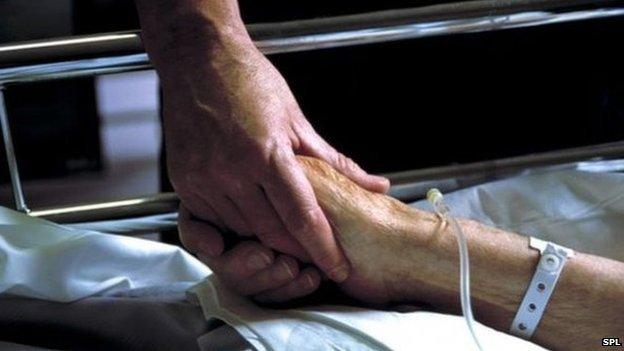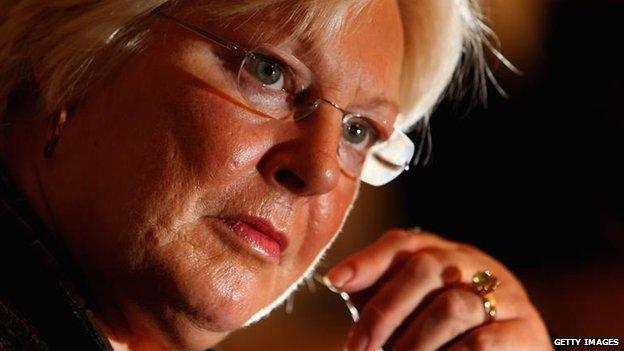Assisted suicide bill 'contains significant flaws' says committee
- Published

The issue of assisted suicide has been discussed at Holyrood's health committee
Proposals to allow assisted suicide in Scotland contain "significant flaws", according to a report from Holyrood's health committee.
A majority of members of the committee opposed the general principles of the legislation.
But they have decided to let the whole Scottish Parliament decide whether or not to throw out the measure.
The assisted suicide bill has been proposed by the Green MSP Patrick Harvie.
It would allow those with terminal or life-shortening illnesses to obtain help in ending their suffering.
MSPs on the health and sport committee said it would need "significant amendment should it progress through the parliamentary scrutiny process".
But they said that, given that the issue of assisted suicide was a matter of conscience, they had chosen to make no formal recommendation to parliament on the bill.
The report said: "The committee believes the bill contains significant flaws. These present major challenges as to whether the bill can be progressed."

The late Margo Macdonald had campaigned for assisted suicide to be legalised in Scotland
The report noted the British Medical Association's observation that "there is no way to guarantee the absence of coercion in the context of assisted suicide."
MSPs also raised concerns that the bill had the potential to undermine suicide prevention messages by "softening cultural perceptions of suicide at the perimeters".
They also said there was an "unacceptable" lack of clarity in some of the language used in the bill.
The committee's report was informed by the written views of more than 800 people and organisations, with oral evidence taken from more than 30 individuals and groups.
Bob Doris, deputy convener of the committee, said: "Whilst we recognised the complex moral and legal issues that arose during our detailed scrutiny, it was important that we listened, debated and heard the many passionate voices on both sides of the debate.
"The committee has recognised throughout its work that the proposed legislation touches lives in a deeply personal way and we thank those individuals for sharing their personal experience.
"The committee's intention was to inform the debate and not influence the outcome as that is a matter of conscience for the parliament when they vote later this month."
MSPs are expected to vote on the proposals before the end of May.
'Ideological opposition'
Mr Harvie agreed to take the bill forward following the death of independent MSP Margo Macdonald, who had campaigned for assisted suicide to be legalised in Scotland.
Previous proposals were rejected by MSPs in a free vote in 2010.
Responding to the committee's concerns, Mr Harvie said he was open to suggestions as to how the legislation could be strengthened.
He added: "This committee report makes no formal recommendation to MSPs, and it's right that members decide on this issue each having considered it carefully.
"It is however disappointing that the committee has placed so little emphasis on the responses I, and others, have given to the criticisms of the bill, many of which are grounded in an ideological opposition to personal choice.
"I am hopeful that MSPs will listen to all sides when the bill reaches the voting stage, and that they will act to end the unnecessary suffering of those who are seeking help to take control at the end of their lives."
Sheila Duffy from My Life, My Death, My Choice, the campaign supporting the bill, said leaving the issue up to MSPs to decide on themselves was "only right and proper".
She added: "It is a huge step forward from a similar stage of previous attempts at this kind of legislation, reflecting the improvements that have been made."
Dr Gordon Macdonald, of opposition campaign Care Not Killing, said: "The bill is poorly thought-out, ill-conceived, badly drafted and effectively not fit for purpose.
"We are delighted that the committee agrees with us that the bill contains significant flaws which are likely to prevent it from being enacted."